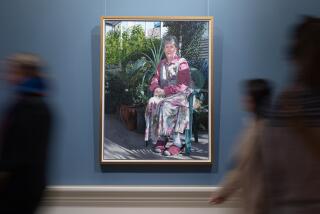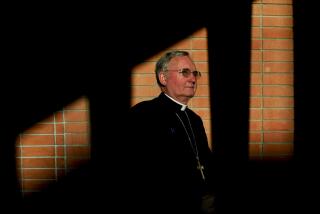True confessions
- Share via
READING Honor Moore’s memoir, a probing account of her complex relationship with her father, the late Paul Moore Jr., Episcopal bishop of the Diocese of New York from 1972until his retirement in 1989, I was reminded of my own upbringing as the daughter of a very different kind of bishop -- one who presided over a Mormon congregation in a small Utah town. Like Moore, I came from a large family -- eight children to her family’s nine -- and the church was the center of our life, its rituals our daily bread. Whenever one of us got sick, for instance, my father would perform a laying-on of hands, anointing our foreheads with olive oil consecrated for this purpose alone and, along with two other elders, placing his hands upon our heads and offering a healing prayer. What I remember is the weight of those hands, the crown of fingers upon my scalp, their heat and power and especially their ineluctable maleness. Even then I understood that this was not something a woman could do. Women did not have priestly powers.
Moore also understood what force could flow through the hands of religious men, as she makes clear in this description of her confirmation: “[T]he bishop lowered his hands onto my veiled head. . . . His hands vibrated, seeming, as heat came through them . . . heavy and comforting because they were so big and my head was so small.” As she is inducted into the “everlasting kingdom,” with everything shimmering around her, she thinks, “Surely this was God . . . the heat and heaviness in Bishop Washburn’s hands.”
I mention this passage and my own connection to it because “The Bishop’s Daughter” is nothing if not an attempt to reconcile Moore’s idea of her father as a man of God, possessed of exalted and mystical powers, with the mortal man she knew so intimately -- a father who sired all those children and yet, as she discovers in adulthood, also led a secret existence as a gay man, conducting affairs with men throughout his entire life.
Priest, devoted father, closeted homosexual: It’s a ripe combination. When an excerpt from “The Bishop’s Daughter” appeared in the New Yorker a few months ago, it elicited a letter from three of Moore’s siblings critical of her for outing their much admired and beloved father. Still, what becomes clear in reading her book is how necessary it was for her to tell the story -- necessary for her understanding of her own sexual nature, and also necessary, she argues, for understanding her father’s suffering and choices. As Moore puts it toward the end of the book, “I came to understand that my own sexual development was inextricably tied up with my father’s complicated erotic life.”
Complicated Paul Moore certainly was. Tall and handsome, the heir to a vast fortune, he was a decorated Marine, wounded at Guadalcanal, who flirted with the notion of entering the priesthood while he was still at Yale. World War II only confirmed his religious calling. The world, he once remarked, was “such an unalterable, stirred up, gory, neurotic, prejudiced, emotional, unstable mess” that human intelligence alone could never resolve its problems. The solution for good Christians was “to think [and] pray like hell so that God can someday enter the lion’s heart.”
Paul Moore’s relationship with his first wife, Honor’s mother -- the beautiful and vibrant Jenny McKean, who also came from wealth -- was a difficult affair, notable initially for its shared religious commitment. The Moores summered at their lodge in the Adirondacks and at a New Jersey farm called Hollow Hill, yet they soon found themselves living among the poor in Jersey City, where Paul Moore became a committed social-activist priest. From the beginning, the Moores appear to have been less a romantic couple than disciplined communicants devoted to the same cause; their marriage would eventually unravel as Jenny Moore began to suspect that her husband was gay. Deeply unhappy, Jenny spent time in a mental hospital before deciding to separate from Paul, only to die in her 50s of cancer. It fell to Paul’s second wife, the sad, alcoholic Brenda, to fully uncover her husband’s secret and announce it to his children.
The news deeply unsettles Honor, who is struggling with her own sexual identity: She has gone from having affairs -- often with older men -- to taking women as lovers. It’s her father’s duplicitousness that troubles her: the way she feels he injured her mother and his refusal to discuss his behavior or explain how he reconciles it with his religious calling -- though he does tell her he believes that religious emotion and sexual feeling arise from “the same mysterious, undifferentiated source,” an intriguing idea to say the least. Shortly after Paul’s death in May 2003, the Episcopal Church’s General Convention approved the blessing of same-sex unions, and V. Gene Robinson became the first gay man elected an Episcopal bishop.
Moore, author of three books of poetry and a biography of her grandmother, the painter Margarett Sargent, has divided her memoir into three sections: “Father,” “Daughter” and “Revelations.” It’s in the last that she finally comes to terms with the “silvery nimbus” of attraction she feels for her remarkable father, as well as with her anger toward him. “The Bishop’s Daughter” is a celebration of Paul Moore’s life and of Honor Moore’s honesty. Paul is a sympathetic figure, more human and fallible and somehow more noble than if we had simply been left with the picture of him as the powerful and renowned bishop of New York. In the end, Honor wishes she could tell him “that to me his living of his passion was heroic.” One feels that both Paul Moore and his daughter have been set free by this book. There is no shame left, and neither is there blame. *
More to Read
Sign up for our Book Club newsletter
Get the latest news, events and more from the Los Angeles Times Book Club, and help us get L.A. reading and talking.
You may occasionally receive promotional content from the Los Angeles Times.










